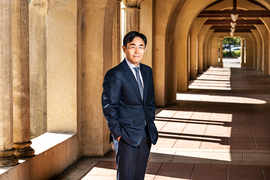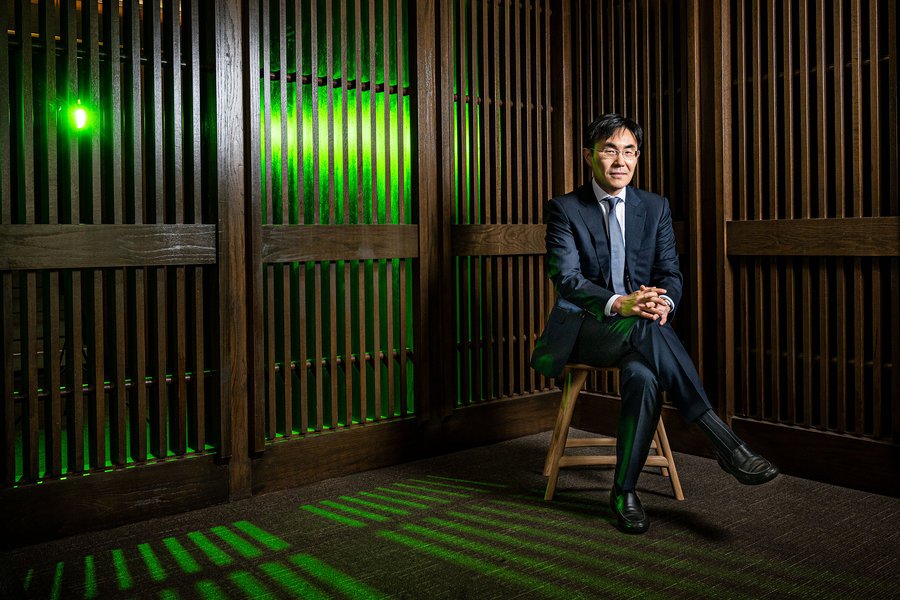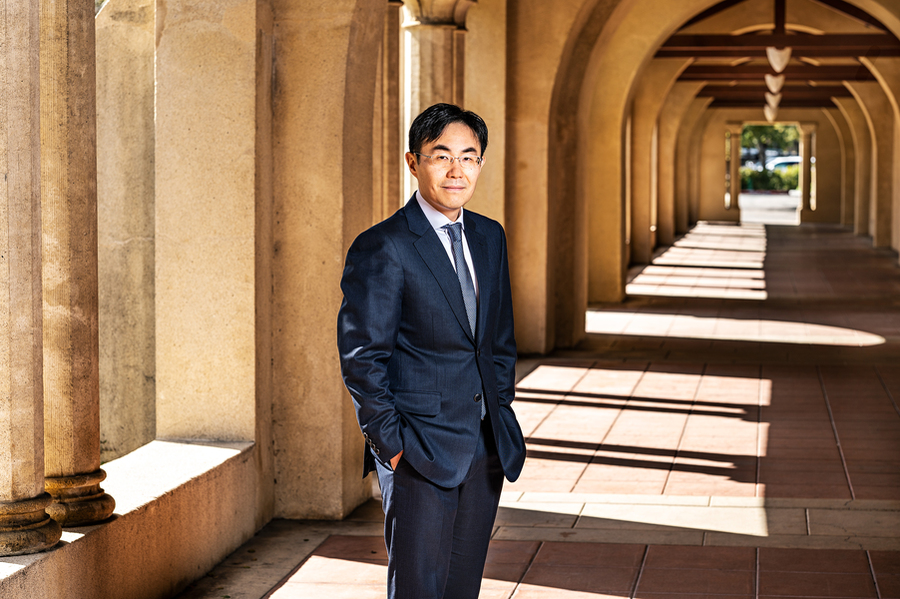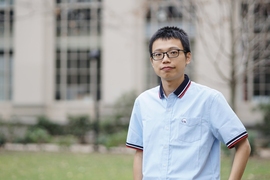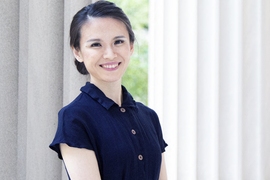You may not know this, but the U.S. imposes a 12.5 percent import tariff on imported flashlights. However, for a product category the federal government describes as “portable electric lamps designed to function by their own source of energy, other than flashlights,” the import tariff is just 3.5 percent.
At a glance, this seems inexplicable. Why is one kind of self-powered portable light taxed more heavily than another? According to MIT political science professor In Song Kim, a policy discrepancy like this often stems from the difference in firms' political power, as well as the extent to which firms are empowered by global production networks. This is a subject Kim has spent years examining in detail, producing original scholarly results while opening up a wealth of big data about politics to the public.
“We all understand companies as being important economic agents,” Kim says. “But companies are political agents, too. They are very important political actors.”
In particular, Kim’s work has illuminated the effects of lobbying upon U.S. trade policy. International trade is often presented as an unalloyed good, opening up markets and fueling growth. Beyond that, trade issues are usually described at the industry level; we hear about what the agriculture lobby or auto industry wants. But in reality, different firms want different things, even within the same industry.
As Kim’s work shows, most firms lobby for policies pertaining to specific components of their products, and trade policy consists heavily of carve-outs for companies, not industry-wide standards. Firms making non-flashlight portable lights, it would seem, are good at lobbying, but the benefits clearly do not carry over to all portable light makers, as long as products are not perfect substitutes for each other. Meanwhile, as Kim’s research also shows, lobbying helps firms grow faster in size, even as lobbying-influenced policies may slow down the economy as a whole.
“All our existing theories suggest that trade policy is a public good, in the sense that the benefits of open trade, the gains from trade, will be enjoyed by the public and will benefit the country as a whole,” Kim says. “But what I’ve learned is that trade policies are very, very granular. It’s become obvious to me that trade is no longer a public good. It’s actually a private good for individual companies.”
Kim’s work includes over a dozen published journal articles over the last several years, several other forthcoming research papers, and a book he is currently writing. At the same time, Kim has created a public database, LobbyView, which tracks money in U.S. politics extending back to 1999. LobbyView, as an important collection of political information, has research, educational, and public-interest applications, enabling others, in academia or outside it, to further delve into the topic.
“I want to contribute to the scholarly community, and I also want to create a public [resource] for our MIT community [and beyond], so we can all study politics through it,” Kim says.
Keeping the public good in sight
Kim grew up in South Korea, in a setting where politics was central to daily life. Kim’s grandfather, Kim jae-soon, was the Speaker of the National Assembly in South Korea from 1988 through 1990 and an important figure in the country’s government.
“I’ve always been fascinated by politics,” says Kim, who remembers prominent political figures dropping by the family home when he was young. One of the principal lessons Kim learned about politics from his grandfather, however, was not about proximity to power, but the importance of public service. The enduring lesson of his family’s engagement with politics, Kim says, is that “I truly believe in contributing to the public good.”
Kim’s found his own way of contributing to the public good not as a politician but as a scholar of politics. Kim received his BA in political science from Yonsei University in Seoul but decided he wanted to pursue graduate studies in the U.S. He earned an MA in law and diplomacy from the Fletcher School of Tufts University, then an MA in political science at George Washington University. By this time, Kim had become focused on the quantitative analysis of trade policy; for his PhD work, he attended Princeton University and was awarded his doctorate in 2014, joining the MIT faculty that year.
Among the key pieces of research Kim has published, one paper, “Political Cleavages within Industry: Firm-level Lobbying for Trade Liberalization,” published in the American Political Science Review and growing out of his dissertation research, helped show how remarkably specialized many trade policies are. As of 2017, the U.S. had almost 17,000 types of products it made tariff decisions about. Many of these are the component parts of a product; about two-thirds of international trade consists of manufactured components that get shipped around during the production process, rather than raw goods or finished products. That paper won the 2018 Michael Wallerstein Award for the best published article in political economy in the previous year.
Another 2017 paper Kim co-authored, “The Charmed Life of Superstar Exporters,” from the Journal of Politics, provides more empirical evidence of the differences among firms within an industry. The “superstar” firms that are the largest exporters tend to lobby the most about trade politics; a firm’s characteristics reveal more about its preferences for open trade than the possibility that its industry as a whole will gain a comparative advantage internationally.
Kim often uses large-scale data and computational methods to study international trade and trade politics. Still another paper he has co-authored, “Measuring Trade Profile with Granular Product-level Trade Data,” published in the American Journal of Political Science in 2020, traces trade relationships in highly specific terms. Looking at over 2 billion observations of international trade data, Kim developed an algorithm to group countries based on which products they import and export. The methodology helps researchers to learn about the highly different developmental paths that countries follow, and about the deepening international competition between countries such as the U.S. and China.
At other times, Kim has analyzed who is influencing trade policy. His paper “Mapping Political Communities,” from the journal Political Analysis in 2021, looks at the U.S. Congress and uses mandatory reports filed by lobbyists to build a picture of which interests groups are most closely connected to which politicians.
Kim has published all his papers while balancing both his scholarly research and the public launch of LobbyView, which occurred in 2018. He was awarded tenure by MIT in the spring of 2022. Currently he is an associate professor in the Department of Political Science and a faculty affiliate of the Institute for Data, Systems, and Society.
By the book
Kim has continued to explore firm-level lobbying dynamics, although his recent research runs in a few directions. In a 2021 working paper, Kim and co-author Federico Huneeus of the Central Bank of Chile built a model estimating that eliminating lobbying in the U.S. could increase productivity by as much as 6 percent.
“Political rents [favorable policies] given to particular companies might introduce inefficiencies or a misallocation of resources in the economy,” Kim says. “You could allocate those resources to more productive although politically inactive firms, but now they're given to less productive and yet politically active big companies, increasing market concentration and monopolies.”
Kim is on sabbatical during the 2022-23 academic year, working on a book about the importance of firms' political activities in trade policymaking. The book will have an expansive timeframe, dating back to ancient times, which underscores the salience of trade policy across eras. At the same time, the book will analyze the distinctive features of modern trade politics with deepening global production networks.
“I’m trying to allow people to learn about the history of trade politics, to show how the politics have changed over time,” Kim says. “In doing that, I’m also highlighting the importance of firm-to-firm trade and the emergence of new trade coalitions among firms in different countries and industries that are linked through the global production chain.”
While continuing his own scholarly research, Kim still leads LobbyView, which he views both as a big data resource for any scholars interested in money in politics and an excellent teaching resource for his MIT classes, as students can tap into it for projects and papers. LobbyView contains so much data, in fact, that part of the challenge is finding ways to mine it effectively.
“It really offers me an opportunity to work with MIT students,” Kim says of LobbyView. “What I think I can contribute is to bring those technologies to our understanding of politics. Having this unique data set can really allow students here to use technology to learn about politics, and I believe that fits the MIT identity.”

